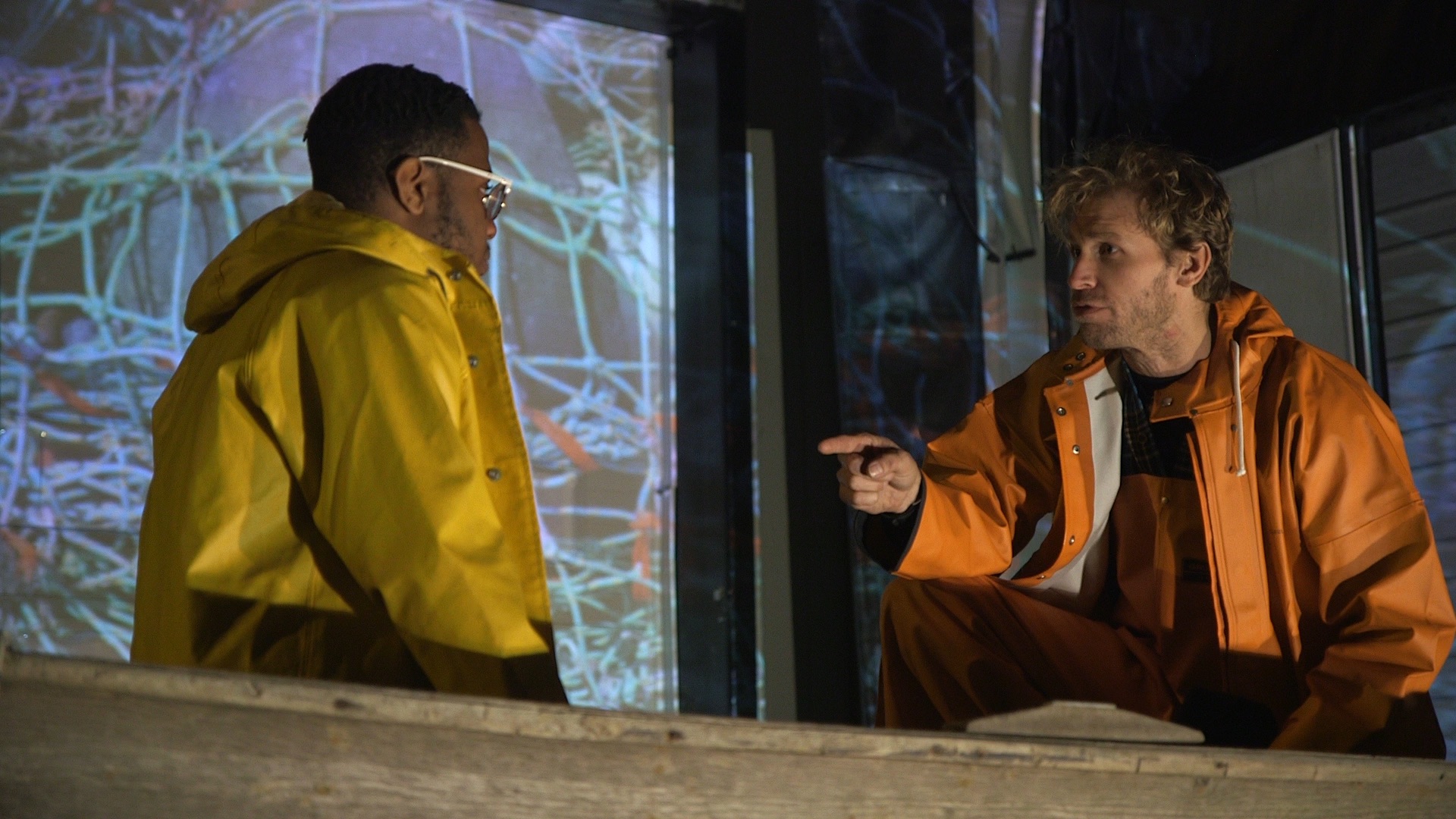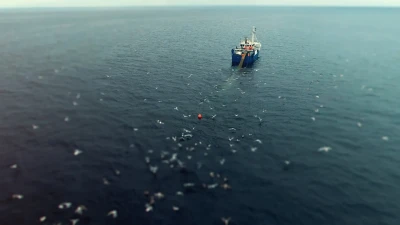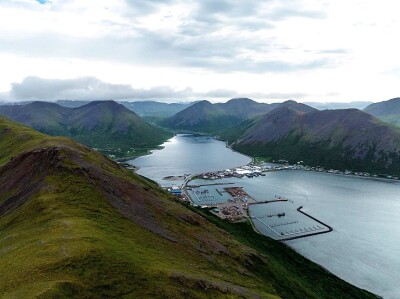“Chasing the New White Whale” brings themes from the commercial fishing industry to audiences ashore. Portland, Maine’s working waterfront hosted a performance of scenes from the play in late October near the Portland Fish Exchange auction house.
The play, created by Michael Gorman, 54, centers around a commercial fishing community as its members attempt “to make a living while pursuing a precarious future in the face of the opiate epidemic — threatening not only their lives, but their pastime and the values and identity tied up with it,” says Gorman.

Playwright Michael Gorman has been interviewing fishermen since 2003 to prepare his new play. Brett Plymale photo.
The final chase in “Moby-Dick” inspired Gorman to adapt a series of staged readings.
“What was Ahab but an addict, really, and what was the Moby Dick but an allusion to opium and heroin, its contemporary scourge?” Gorman asks.
The hero of “Chasing the New White Whale” is the fictional commercial fishing Captain Robby Foerster, who encounters addiction after his first brush with heroin. The action follows the captain, who heroically tries to “kill the new white whale” and help his community, as they face addiction together.
The plight of a modern-day commercial fishing captain and Ahab’s pursuit of Moby Dick, moves between present day and ancient whaling eras.
“The ocean is perhaps the greatest metaphor for the subconscious and all those things that we dream and wonder about,” says Gorman. “It’s a beautiful, but also dangerous place.”
As for the outdoor and unconventional site for the play (the exterior of the Portland Fish Exchange), Gorman says he wanted to make the subject matter, characters and issues authentic.
Michel Droge, a Portland-based visual artist, contributed work to the production. In 2011, Droge started a series of paintings called Hiraeth. The series, says Droge, is Welsh for an aching, or longing, for a home, or thing, that you can never have.
“That same aching and longing,” she says, “is a symptom of the addictive cycle.”
Much of Droge’s work deals with the sea and making the invisible visible. She investigates “how people who make a living on the water respond to the sublime.”
Droge is 20 years in recovery for a heroin addiction. She also lost her brother to addiction in 2010.
As part of her work, Droge has interviewed fishermen in Maine’s coastal communities.
“Art is an important aspect of the healing journey. The arts tap into the spirit — music, plays, paintings can all be seen as art therapy, but also as access to the human soul. Joy, soul, spirit are all things you find in the arts,” she adds.
Droge says she hopes Gorman’s production will shine light or be a relief to people working in the commercial fisheries, without casting shame or blame.
“There’s hope, there’s love, there’s concern,” she says, “and we get it. No one is saying, ‘Oh, we’re going to fix this all.’ But to have these conversations happen is such a relief. Who hasn’t been touched by addiction?”
The production includes projections of Droge’s paintings, moving boats on wheels, costumes and characters. It all combines into a poignant statement from the fishing community, which Gorman says desperately needs to be heard from.
“Too many people are suffering from the stigmatization, as well as the disease, of addiction,” he says.
For Gorman, the themes are personal. He lost his own brother, a commercial fisherman from New Bedford, Mass., to opiate addiction.
“Having lost my brother to opiate addiction, and having imbued the [work] with his spirit, I think many others will find some solace from this epidemic that is larger than all of us,” he says.
He says it’s likely that his brother would have enjoyed the play himself.
“He was a music person and a huge reader — he was antithetical to the stereotype of an addict,” says Gorman. “And he was supportive of my risks and endeavors. I would not have done this kind of creative work if I didn’t have a brother who was taking risks and encouraging me to do it.”
Gorman says it means a lot to “share this work with Mainers, largely due to the independent spirit that they share.
“I feel it can be an admirable quality, but at times, also a potentially limiting trait. The confidence and resourcefulness that often results from an independent spirit can lead to an unwillingness or hesitancy to ask for help,” he says. “It can also lead to resistance to doing things differently. This reality can be an obstacle, I believe, for fishermen, and proud working people in general, in seeking medical assistance and help for addiction.”
Mostly, Gorman hopes that fishermen, and fishing communities, see the play.
In preparation, Gorman has been interviewing fishermen since 2003.
Robbie Robberge, a commercial fishing captain who works out of Portland and Boston, and who is in recovery, came to see the production with his wife.
“It just connects with the fishing industry and every bit of it is exactly how it is,” says Robberge. “How the drugs interplay with fishing, and the lives and the people it destroys. I know, I was in that sad, deep, and dark place for years until I pulled my way out of it. I think of the friends in this industry that I have lost.”
Robberge credits friends and family in supporting his own recovery.
“You go and you spend all this time on the ocean, with 30-foot seas and crashing, and you look at it like it’s nothing,” says Robberge of the fishing life. “And you come home, and one substance and you are done, you know?” He adds, “If I died in a fishing accident, you would have that… you know, like a sense of pride, you know? But when it’s an overdose, it’s just seen as another addict that passed away.”
“Chasing the New White Whale” will run at in the Ellen Stewart Theater at La MaMa in New York City from Nov. 24 to Dec. 9. Robberge will travel to the city to see the production and participate in the Q&A panel after the show.
“Honestly,” adds Gorman, “I have never had a fear that people in the fishing industry would be too scared to talk or engage with this piece. I have had that fear, and in fact, that experience, with people outside of the industry — for fear of how their town or community will be portrayed, but not in the fishing community. Maybe that’s because fishermen are realists, perhaps even fatalists, on some level, and inherently know the inevitable results of denial.”
More info about “Chasing the New White Whale” can be seen at: www.fortyhourclub.com. More info about Michel Droge’s work is at www.micheldroge.com.







